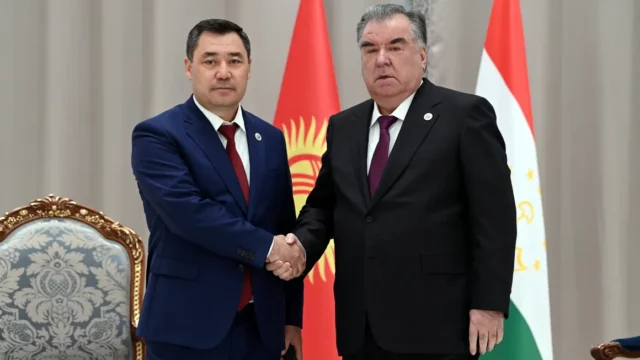
Precedent-Setting Accord Between Kyrgyzstan and Tajikistan May Save Exclaves
Publication: Eurasia Daily Monitor Volume: 20 Issue: 185
By:

As Armenia and Azerbaijan struggle to come up with an agreement on their borders that will address the future of each country’s exclaves (see EDM, November 28), Tajikistan and Kyrgyzstan reached an informal agreement on December 1 about arrangements for the Tajik exclave of Vorukh. The agreement could end the military conflict between the two countries and serve as a precedent for other post-Soviet states. The new accord specifies that the exclave will continue to exist and that there will be unimpeded transportation and communication corridors between Vorukh and Tajikistan (Asia-Plus, December 4). With 30 other exclaves in Central Asia and 10 additional ones elsewhere in the post-Soviet space, the agreement between Dushanbe and Bishkek could represent a turning point in the management and administration of exclaves throughout the region and in the South Caucasus. (On why the Soviets set up these territorial exclaves and how these exclaves have sparked conflicts, see Window on Eurasia, October 29, 2020; for specifics on the Vorukh exclave and the armed conflict around it over the past three decades, see Asia-Plus, April 5, 2021.)
In 2021, Kyrgyzstan reached a border accord with Uzbekistan by exchanging small parcels of land (see EDM, March 18, 2021). Many observers expressed the hope that something similar could be worked out between Kyrgyzstan and Tajikistan regarding Vorukh (Window on Eurasia, March 20, 2021). Several factors cast doubt on the realistic prospects for such an arrangement. First, the linguistic and cultural differences between Tajiks and Kyrgyz are far deeper than those between Kyrgyz and Uzbeks. Second, Dushanbe has been pressuring Kyrgyz nationals in Tajikistan to leave, something that has radicalized public opinion on both sides (see EDM, November 3, 2022). Third, the areas that would have to be exchanged to make such an accord possible are much larger and historically far more fraught than was the case with the land and body of water exchanged along Kyrgyzstan and Uzbekistan’s shared border. Fourth and perhaps most important, the Tajik-majority Vorukh exclave is unique in that it was set up by local action rather than outside fiat.
At that time, Tajikistan’s president, Emomali Rahmon, dug in his heels and declared he would never trade away Vorukh as part of a border deal with Kyrgyzstan. He asserted that the region, with its 30,000 people has always been part of Tajikistan and always will be (24.kg; Sputnik Kyrgyzstan, April 9, 2021). In this context, the Vorukh exclave appeared to have become a symbol of Tajik sovereignty and the rock on which any border agreement between the two countries would flounder (Sputnik Tajikistan, April 10, 2021).
The lack of official support for a territorial swap led to more clashes between Tajikistan and Kyrgyzstan. Many feared that these skirmishes might lead to a full-scale war that would involve outside actors, including Islamist extremists from Afghanistan (see EDM, November 3, 2022). Some experts in Moscow even suggested that Western countries and China may be stirring the pot and could become more directly involved, forcing Russia to do the same (Fondsk.ru, May 1, 2021). The fragility of the two countries directly involved—neither Tajikistan nor Kyrgyzstan have the armed forces needed for a sustained military operation—and a new spirit of cooperation emerging across Central Asia in recent months ultimately pushed Bishkek and Dushanbe to engage in talks that have now led to an agreement that holds promise in resolving the conflict.
Over the past six months, Bishkek and Dushanbe have intensified talks to delimit their 970-kilometer (602-mile) border and deal with the exclave issue. Consistent progress had been regularly announced on the border negotiations, but until last week, similar progress had not been made on the exclave issue (Sputnik Tajikistan, November 24). The situation has now changed, with the two sides agreeing in principle that each country will retain its sovereignty over the exclaves situated on the territory of the other and have unfettered access to the transportation and communication links between that country and its exclaves. The two governments also appear to have agreed that water-sharing arrangements, critical in this increasingly parched region, will remain in place so that neither country could force the issue in the future by denying exclaves the water supply they need to survive (Vb.kg, December 4; Sputnik Kyrgyzstan, December 5).
The heads of the two national delegations on December 1 expressed the view that the agreement in principle would soon serve as the foundation for a formal agreement that the two countries intend to ratify. Expert observers in the region were unanimous that the December 1 meeting represents a turning point for the exclave issue and overall relations between the two countries. Perhaps even more significant, the heads of both delegations and the expert community in Central Asia expressed confidence that what had been agreed to regarding Vorukh and access to it would extend to other exclaves in the two countries (Sputnik Tajikistan, December 2).
These officials and experts did not say that other post-Soviet states would copy the agreement between Kyrgyzstan and Tajikistan. These other countries are almost certainly keeping a close eye what Bishkek and Dushanbe have done. Sizeable populations inhabit many of the 25 other exclaves in Central Asia, though that is not the case with the Azerbaijani and Armenian exclaves in the South Caucasus. There, the ethnic populations for which the exclaves were created have almost all been expelled. The Bishkek-Dushanbe accord, nevertheless, is likely to encourage those in Azerbaijan and Armenia who do not want to yield any territory to insist that exclaves be retained by the republic for which they were created and that access between them and the country of their common titular ethnicity be guaranteed. If such demands are voiced, the danger grows that what has presumably solved a border dispute in Central Asia could delay the resolution of another in the South Caucasus.



